Tokyo Tech conducted its Winter Program from November 28, 2017 to February 6, 2018. Aimed to promote internationalization by inviting students from partner universities to conduct short-term research projects in Tokyo Tech labs, the program welcomed a total of 14 students from the University of Melbourne, the Technical University of Munich, and the University of New South Wales. This was the second year of the program.
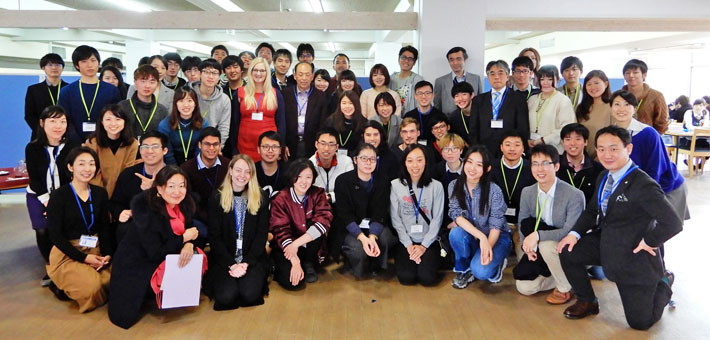
Winter Program participants with Tokyo Tech faculty members, students, and program staff at welcome lunch on first day of program
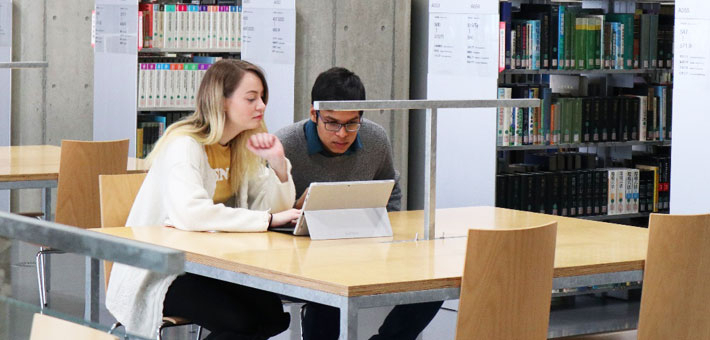
University of Melbourne students at Tokyo Tech Library, Ookayama Campus
Research-focused program
The centerpiece of the Winter Program was the 10-week individual research project each participant conducted under the guidance of a Tokyo Tech faculty member. The students also participated in a compulsory Japan Studies course — organized specifically for Tokyo Tech's Summer and Winter Programs — which included lectures on the history of Tokyo Tech, the history of Japanese science from the Edo to Meiji periods, Japanese design, and site visits to a domestic company and a research institute.
Experience at Aoyagi Laboratory
Hannah Merrigan
Master's student, School of Engineering, The University of Melbourne
I spent 10 weeks conducting my engineering research project alongside the members of the Aoyagi Laboratory. During my time at Tokyo Tech, I investigated the design requirements of a wireless electronic stethoscope for respiratory rate monitoring in healthcare applications.
It was wonderful to have the support and wisdom from my supervisor and the other students in my lab. From the very first week, they were including me in their seminars and colloquiums, exposing me to new research concepts, and even challenging me to present my own. I found the community at Tokyo Tech to be so incredibly welcoming. I was even lucky enough to go on a ski trip to Hakuba in Nagano Prefecture with my lab, and my supervisor taught me to ski.
However, there was so much more to this program outside of the lab. I spent my first week getting to know the other Winter Program students in a crash course for beginners to the Japanese language. We also all undertook Japan Studies classes exploring the rich culture, history, and groundbreaking engineering technology in Japan. These classes were an absolute highlight of the program. My top memory from Japan Studies was the fieldtrip — on a bus equipped with a karaoke system — that ended in a snowball fight. A close second was wearing a beautiful kimono and eating Japanese sweets during a traditional tea ceremony.
This program gave me the opportunity of a lifetime to experience Tokyo on another level: not as a tourist but as a student. I'd strongly encourage anyone interested in enriching their university degree while exploring Japan to apply to this program.
Takahiro Aoyagi
Associate Professor, Department of Electrical and Electronic Engineering, School of Engineering
Our laboratory forges cutting-edge research in electromagnetic compatibility (EMC) and wireless communications. Medical Information Communication Technology (MICT), which aims at improving health care and medical services, is one of most fascinating research topics in our laboratory. Hannah studied the field of Wireless Body Area Networks (WBANs), wireless communication technologies that enable us to remotely monitor vital signs and physical conditions.
forges cutting-edge research in electromagnetic compatibility (EMC) and wireless communications. Medical Information Communication Technology (MICT), which aims at improving health care and medical services, is one of most fascinating research topics in our laboratory. Hannah studied the field of Wireless Body Area Networks (WBANs), wireless communication technologies that enable us to remotely monitor vital signs and physical conditions.
Hannah expressed strong motivation for a research experience at Tokyo Tech and sent me several research proposals. Taking into account the short period of the program, I suggested she conduct a research project focused on developing an IoT sensor used for measuring breath sounds and testing the signal processing for the device.
She engaged herself in designing a print circuit board (PCB) and in fabricating the electronic circuit with soldering. During the program period, she actively participated in lab seminars and presentations as well as the lab trip.
I am very thankful to Hannah for joining our lab and, in addition to her research activities, giving a good incentive for Japanese students in the lab to communicate in English.
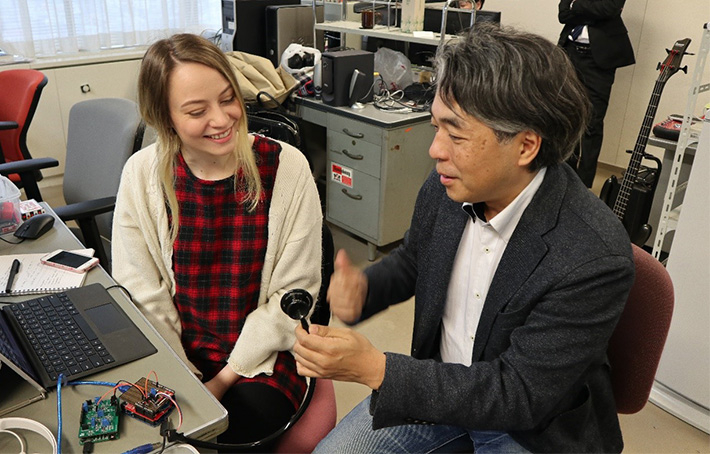
Professor Aoyagi provides research guidance
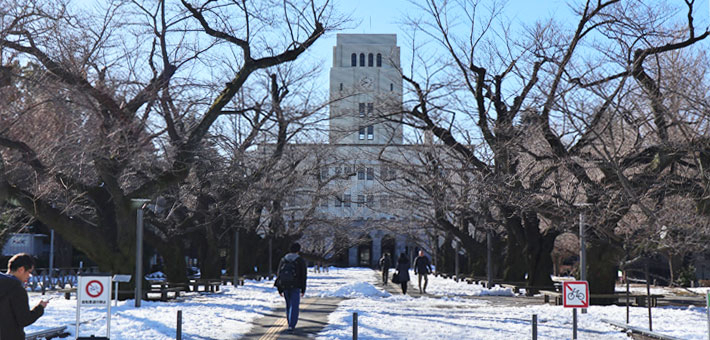
Ookayama Campus snow on January 22
Experience at Terano Laboratory
Manuel Nickel
Master's student, Department of Computer Science, Technical University of Munich
Having picked up a second major in Japanese Studies as a cultural supplement to my robotics master's courses, I was determined to visit Japan once more before I finish my studies in Germany. The Tokyo Tech Winter Program seemed to be the perfect opportunity to do so.
At its core, the Winter Program at Tokyo Tech provides a chance to do research in a laboratory of one of Japan's most renowned universities. However, it entails a lot more than that. A lot of effort has been made to enable the participating students to make the most out of their stay. From an amazing tea ceremony to research institute site visits, we had experiences that not even many Japanese have in their lives. Being a master's student in robotics and artificial intelligence, I was assigned to the Terano Laboratory on Suzukakedai Campus. I tackled the problem of detecting arm movements from EEG and EMG data using recurrent neural nets, a field in which I have personal interest. What struck me the most was how warmly everybody welcomed me as a new, though only temporary, member of the Terano Laboratory. Professor Terano and the other laboratory members were always very supportive of me and made my time in Japan valuable and memorable.
I highly recommend the Winter Program to everybody who wishes to experience something different from their usual curriculum and widen their horizon. I am very glad to have had these experiences and look forward to seeing my friends again in the future.
Takao Terano
Professor, Department of Computer Science, School of Computing
The Terano Laboratory is nicknamed GEAR , which stands for Gallery for Evolutionary Computation and Artificial intelligence Researches. Manuel has much interest in artificial intelligence, especially deep learning, and the topic he selected for his research with us very much matched the topics that cause excitement among our members. As a result, communication and discussions between Manuel and our members about both our research and Japanese life were very smooth and fruitful. Manuel said this was his second experience in an international course in Japan, the first having been at Osaka University. He even ran into an old friend from Osaka University one day in Shibuya. The world is small enough for people to have these experiences in both academic and daily life. I hope Manuel and our lab's members have another chance to enjoy the natto restaurant again in the near future.
, which stands for Gallery for Evolutionary Computation and Artificial intelligence Researches. Manuel has much interest in artificial intelligence, especially deep learning, and the topic he selected for his research with us very much matched the topics that cause excitement among our members. As a result, communication and discussions between Manuel and our members about both our research and Japanese life were very smooth and fruitful. Manuel said this was his second experience in an international course in Japan, the first having been at Osaka University. He even ran into an old friend from Osaka University one day in Shibuya. The world is small enough for people to have these experiences in both academic and daily life. I hope Manuel and our lab's members have another chance to enjoy the natto restaurant again in the near future.
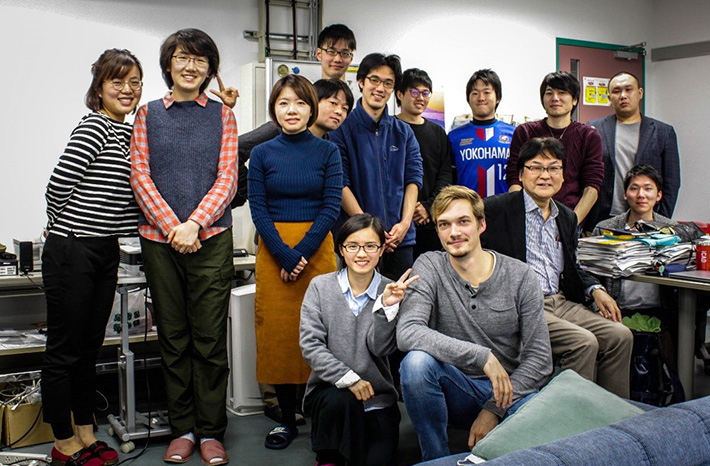
Terano Lab members
Site visits
On December 6, Winter Program participants visited the Negishi refinery of JXTG Nippon Oil and Energy as part of the Japan Studies course. The students carefully took notes as they received a briefing on the company, the refining process and the company's products. A company representative explained the company's sustainability efforts. After a lively Q&A session, participants toured the immense refinery by bus. They observed ethyl tert-butyl ether (ETBE) production and the residue fluid catalytic cracking (RFCC) process and viewed hydrogen production apparatus and fire prevention equipment.
On December 12, the group visited Fukushima Renewable Energy Institute, AIST (FREA) with Professor Shiro Yoshikawa from Tokyo Tech's School of Materials and Chemical Technology and Dr. Catherine Sutton from the University of Melbourne. They toured the research facilities following a briefing on the institute's activities, which include development of production and utilization technologies for hydrogen energy carriers, advanced wind assessment technologies, a monitoring system for geothermal power generation, and technologies for producing ultrathin solar cells.
Through the visit, the students were able to deepen not only their understanding of Japan's advanced research in renewable energy fields, but also the background for such research in Japan.
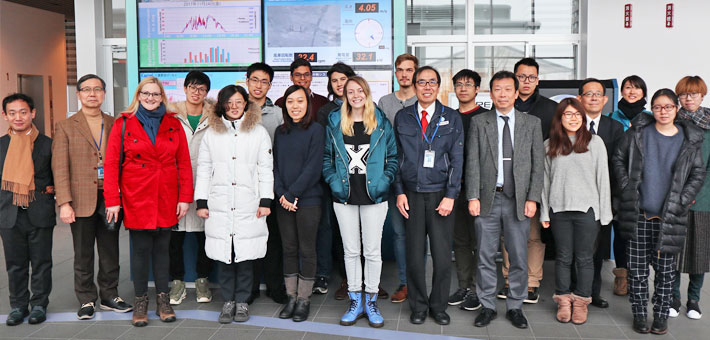
Visit to FREA
Experiencing Japan
Outside the research activities and Japan Studies course, the Winter Program provided participants a variety of optional activities, such as a beginner-level Japanese language classes through the Institute of Liberal Arts and a tea ceremony and kimono experience held in cooperation with Meguro International Friendship Association (MIFA). An optional home visit program, in which participants spent time at the homes of local Tokyo Tech students and their families, provided further opportunities to learn about family life in Japan and to develop friendships with Tokyo Tech students.
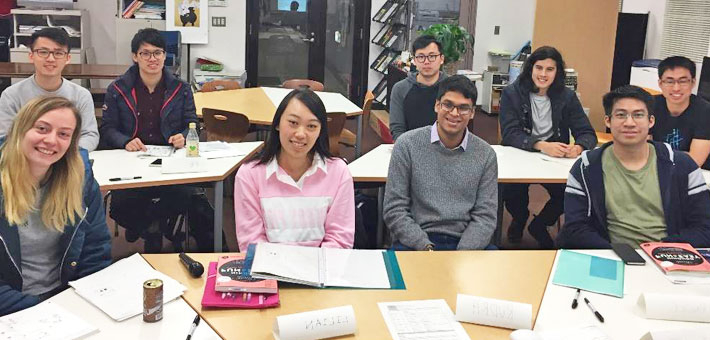
Japanese language class
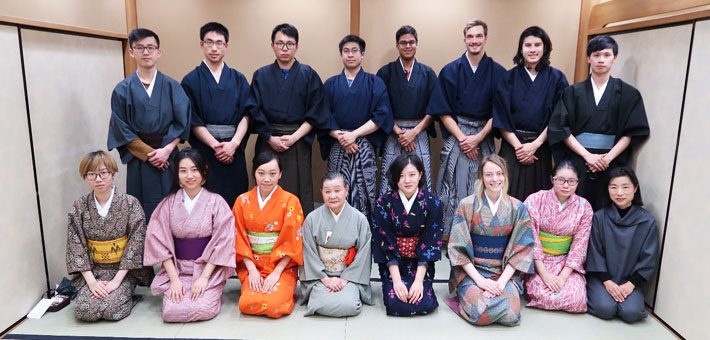
Tea ceremony and kimono experience
Networking event
The program also encouraged interaction between the participants and Tokyo Tech students planning to study abroad through short-term programs at the University of Melbourne and Monash College. At an event held for these students to get to know each other, mixed teams considered the question, "How can we stimulate exchange between Japan and Australia?" At the end of the event, the teams made brief presentations on their ideas. Many of the students exchanged contact information and promised to meet again in Australia in March.
Final presentations
On the final day of the Winter Program, participants made presentations on their research projects to an audience comprised of program staff, host faculty members, and lab mates. The participants' enthusiastic remarks made clear that their knowledge and research skills had been enhanced through their experiences at Tokyo Tech.
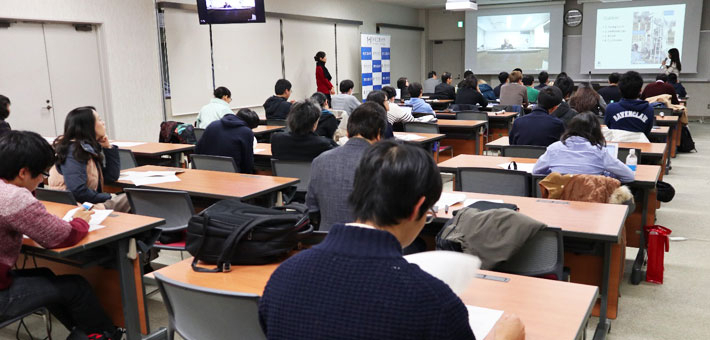
Presenting results of 10-week research projects
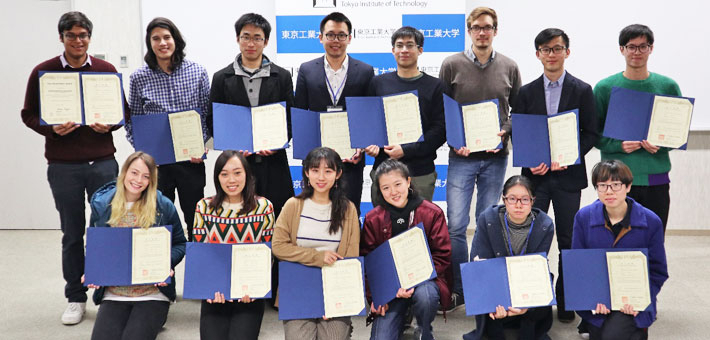
Winter Program participants display their certificates of completion
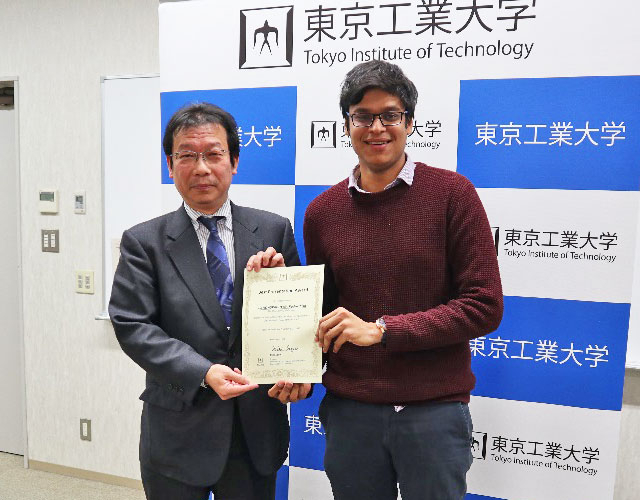
Student receives Best Presentation Award from Vice President for International Affairs Hidetoshi Sekiguchi
The Tokyo Tech Summer and Winter Programs are conducted as part of Tokyo Tech's Top Global University Project.
. Any information published on this site will be valid in relation to Science Tokyo.













